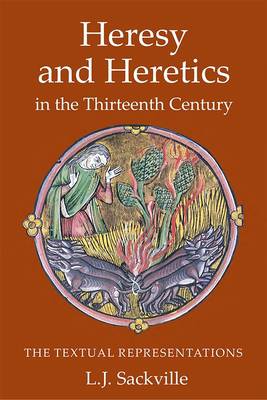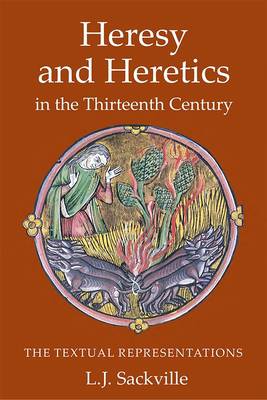
Door een staking bij bpost kan je online bestelling op dit moment iets langer onderweg zijn dan voorzien. Dringend iets nodig? Onze winkels ontvangen jou met open armen!
- Afhalen na 1 uur in een winkel met voorraad
- Gratis thuislevering in België vanaf € 30
- Ruim aanbod met 7 miljoen producten
Door een staking bij bpost kan je online bestelling op dit moment iets langer onderweg zijn dan voorzien. Dringend iets nodig? Onze winkels ontvangen jou met open armen!
- Afhalen na 1 uur in een winkel met voorraad
- Gratis thuislevering in België vanaf € 30
- Ruim aanbod met 7 miljoen producten
Zoeken
€ 59,95
+ 119 punten
Omschrijving
The first book to deal with all the principal treatments of heresy and anti-heretical writings during their heyday in the thirteenth century. Heresy is always relative; the traces that it leaves to us are distorted and one-sided. In the last few decades, historians have responded to these problems by developing increasingly sophisticated methodologies that help to unravel and illuminate the tangled layers from which the texts that describe heresy are built, but in the process have made our reading of heresy fractured and disconnected.
Heresy and Heretics seeks to redress this by reading the different types of anti-heretical writing as part of a wider, connected tradition, considering all the principal orthodox treatments of heresy for the first time. Drawn from the mid-thirteenth century, a time when both medieval heresy and the church's response to it were at their zenith, they describe a spectrum of material that ranges from the theological arguments of some of the greatest thinkers of the age to the homely sermons of the wanderingpreachers. In considering the whole scope of anti-heretical writing from this period, it becomes apparent that, far from being an artificial construct isolated from reality, the church's treatment of heresy in fact had a far morecomplex relationship with its subject matter. Dr L.J. Sackville teaches in the Department of History, University of York.
Heresy and Heretics seeks to redress this by reading the different types of anti-heretical writing as part of a wider, connected tradition, considering all the principal orthodox treatments of heresy for the first time. Drawn from the mid-thirteenth century, a time when both medieval heresy and the church's response to it were at their zenith, they describe a spectrum of material that ranges from the theological arguments of some of the greatest thinkers of the age to the homely sermons of the wanderingpreachers. In considering the whole scope of anti-heretical writing from this period, it becomes apparent that, far from being an artificial construct isolated from reality, the church's treatment of heresy in fact had a far morecomplex relationship with its subject matter. Dr L.J. Sackville teaches in the Department of History, University of York.
Specificaties
Betrokkenen
- Auteur(s):
- Uitgeverij:
Inhoud
- Aantal bladzijden:
- 240
- Taal:
- Engels
- Reeks:
- Reeksnummer:
- nr. 1
Eigenschappen
- Productcode (EAN):
- 9781903153567
- Verschijningsdatum:
- 21/08/2014
- Uitvoering:
- Paperback
- Formaat:
- Trade paperback (VS)
- Afmetingen:
- 156 mm x 234 mm
- Gewicht:
- 344 g

Alleen bij Standaard Boekhandel
+ 119 punten op je klantenkaart van Standaard Boekhandel
Beoordelingen
We publiceren alleen reviews die voldoen aan de voorwaarden voor reviews. Bekijk onze voorwaarden voor reviews.











